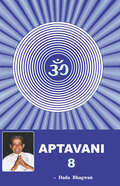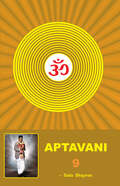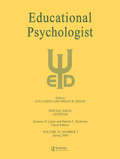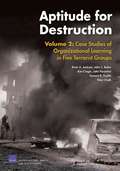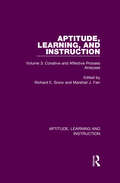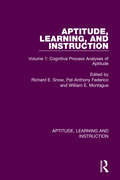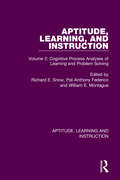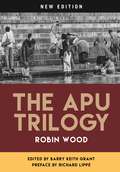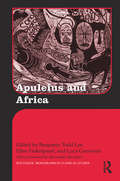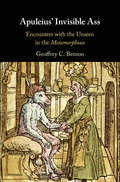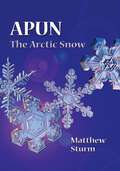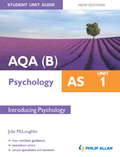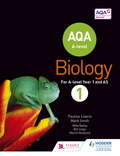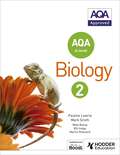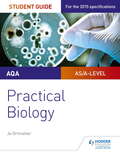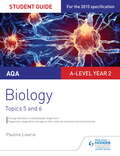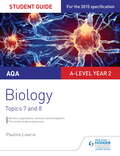- Table View
- List View
Aptavani - 8
by Dada Bhagwan“Aptavani 8” is the eighth in a series of spiritual books titled “Aptavani”. In this series, Gnani Purush (embodiment of Self knowledge) Dada Bhagwan addresses age-old unanswered questions of spiritual seekers. Param Pujya Dadashri offers in-depth answers to questions such as: “What does karma mean, and what is the law of karma?”, “How was the world created, and what is the journey of souls?”, and “Who am I, and who is the ‘Doer’ (ego definition)?” Pujya Dadashri also provides profound explanations on: “What is spirituality?”, “How can I experience the spiritual power of my pure Soul?”, “What are the signs of spiritual awakening?”, “How may I attain spiritual enlightenment and lead a spiritual life?” For those wanting to learn how to become more spiritual, Pujya Dadashri describes how to attain the Self - explaining that the knowledge of Self is spiritual awakening, and the beginning of true spirituality.
Aptavani - 9
by Dada Bhagwan“Aptavani 9” is the ninth in a series of spiritual books titled “Aptavani”. In this series, Gnani Purush (embodiment of Self knowledge) Dada Bhagwan addresses age-old unanswered questions of spiritual seekers. Dadashri offers in-depth answers to questions such as: “What is the definition of ignorance, the definition of self awareness, and the definition of freedom – and are they all related?”, “What are the signs of spiritual awakening?”, “If I gain spiritual power from spiritual practices, is that dangerous to my spirituality in any way?, “What is liberation, or moksha?” For those desirous of attaining moksha, Dadashri explains that certain pitfalls must be avoided in the process of spiritual development. He describes how, in spirituality and practice, one must be careful not to fall into a lack of awareness. From understanding “Who am I?” and attaining knowledge of Self, true spirituality unfolds within, which supports a spiritual life leading to ultimate liberation.
AptDeco: Circular Economy Furniture Marketplace
by Ayelet Israeli Jamie MerkrebsAptDeco, a used furniture marketplace was growing rapidly in the tri-state area. The Co-Founders were confident that the business model, financial position, and unit economics positioned AptDeco for scaling in the massive $120 billion furniture market, despite its complexity and high costs. The co-founders were looking at different options to scale: working to convert sellers into buyers and vice versa, finding superusers that would fuel the supply for their platform, expand to new markets, rebrand with a sustainability focus. What is the best way for them to scale?
Aptitude: A Special Issue of Educational Psychologist (Educational Psychology Ser.)
by Lyn Corno Patrick C. Kyllonen Philip H. Winne Susanne P. LajoieRichard Snow's research influenced many students and colleagues, both directly through his findings and indirectly by inspiring others to carry on the work. A cross-section of his influence is represented in this special issue. The articles present several themes in his work, including the importance of multivariate considerations of individual differences, adapting instruction to individual learners, a process understanding of aptitude, and an enlarged role for spatial ability. Each paper picks up one of the themes identified--trait complexes, ATIs, process analyses, and spatial ability--and has a strong quantitative, empirical foundation but is nested within appropriately complex theoretical frameworks.
Aptitude for Destruction, Volume 2
by Kim Cragin John C. Baker Peter Chalk John V. Parachini Brian A. JacksonBetter ways are needed to understand how terrorist groups increase their effectiveness and become more dangerous. Learning is the link between what a group wants to do and its ability to actually do it; therefore, a better understanding of group learning might contribute to the design of better measures for combating terrorism. This study analyzes current understanding of group learning and the factors that influence it. It presents detailed case studies of learning in five terrorist organizations and develops a methodology for ascertaining what and why groups have learned, providing insights into their learning processes.
Aptitude, Learning, and Instruction: Volume 3: Conative and Affective Process Analyses (Aptitude, Learning and Instruction)
by Richard E. Snow and Marshall J. FarrOriginally published in 1987, this book reports the proceedings of a conference held in 1983 at Stanford, California. The purpose of the conference was to bring together individuals whose research reflected advanced theoretical thinking and empirical evidence on the combined analysis of cognitive, conative, and affective processes, the role of these processes in learning from instruction, and the importance of individual differences therein. The Editors believed that this volume made an early and important contribution to the reemphasis and reexamination of the conative and affective aspects of human performance, in coordination with cognitive psychology, in the study of aptitude, learning, and instruction. It takes its place as Volume 3 of the Aptitude, Learning, and Instruction series.
Aptitude, Learning, and Instruction: Volume 1: Cognitive Process Analyses of Aptitude (Aptitude, Learning and Instruction)
by Richard E. Snow, Pat-Anthony Federico and William E. MontagueFor the previous 6 years before publication, Office of Naval Research (ONR) had been conducting a thematically oriented contract research program aimed, in large part, at developing the kind of broad theoretical framework necessary for a workable process interpretation of aptitude, learning, and performance. Originally published in 1980, the papers in this collection are generally addressed to three broad areas that were central to those interests of the ONR Personnel and Training Research Programs. One area is concerned with individual differences information processing, as revealed in simple laboratory or psychometric tests. The second area focuses on the structural aspects of learning and performance, using tools and concepts from semantic memory theory to describe what is learned and how it is learned. And the third area is aimed at the management of instruction: It addresses itself to the kinds of research and instructional designs required for effective implementation of adaptive instruction.
Aptitude, Learning, and Instruction: Volume 2: Cognitive Process Analyses of Learning and Problem Solving (Aptitude, Learning and Instruction)
by Richard E. Snow, Pat-Anthony Federico and William E. MontagueFor the previous 6 years before publication, Office of Naval Research (ONR) had been conducting a thematically oriented contract research program aimed, in large part, at developing the kind of broad theoretical framework necessary for a workable process interpretation of aptitude, learning, and performance. Originally published in 1980, the papers in this collection are generally addressed to three broad areas that were central to those interests of the ONR Personnel and Training Research Programs. One area is concerned with individual differences information processing, as revealed in simple laboratory or psychometric tests. The second area focuses on the structural aspects of learning and performance, using tools and concepts from semantic memory theory to describe what is learned and how it is learned. And the third area is aimed at the management of instruction: It addresses itself to the kinds of research and instructional designs required for effective implementation of adaptive instruction.
Aptiv PLC Board of Directors
by Lynn Sharp PaineAptiv’s board must decide whether a joint venture with an auto maker is the right next step in the company’s efforts to develop and commercialize a production-ready autonomous driving system. While many commentators believed that Aptiv’s self-driving technologies had the potential to revolutionize vehicle use and generate enormous financial returns, the company was in a high-profile and increasingly capital intensive race among some of the world’s technology giants to achieve that goal—and much more investment would be needed. As the management team began exploring the possibility of working with a partner to share the costs and accelerate their research and development activities, they turned to the board for strategic guidance. The case describes the role of the board and its Innovation and Technology Committee (ITC) in the company’s transformation from a traditional auto parts supplier to a high-technology firm focused on the future of mobility and lays out the factors directors are weighing as they consider the possibility of forming a major joint venture with a vehicle manufacturer.
Aptiv PLC Board of Directors (A)
by Lynn Sharp Paine Will HurwitzAptiv's board must decide whether a joint venture with an auto maker is the right next step in the company's efforts to develop and commercialize a production-ready autonomous driving system. While many commentators believed that Aptiv's self-driving technologies had the potential to revolutionize vehicle use and generate enormous financial returns, the company was in a high-profile and increasingly capital intensive race among some of the world's technology giants to achieve that goal - and much more investment would be needed. As the management team began exploring the possibility of working with a partner to share the costs and accelerate their research and development activities, they turned to the board for strategic guidance. The case describes the role of the board and its Innovation and Technology Committee (ITC) in the company's transformation from a traditional auto parts supplier to a high-technology firm focused on the future of mobility and lays out the factors directors are weighing as they consider the possibility of forming a major joint venture with a vehicle manufacturer.
Aptiv PLC Board of Directors (B)
by Lynn Sharp Paine Will HurwitzAptiv's board must decide whether a joint venture with an auto maker is the right next step in the company's efforts to develop and commercialize a production-ready autonomous driving system. While many commentators believed that Aptiv's self-driving technologies had the potential to revolutionize vehicle use and generate enormous financial returns, the company was in a high-profile and increasingly capital intensive race among some of the world's technology giants to achieve that goal - and much more investment would be needed. As the management team began exploring the possibility of working with a partner to share the costs and accelerate their research and development activities, they turned to the board for strategic guidance. The case describes the role of the board and its Innovation and Technology Committee (ITC) in the company's transformation from a traditional auto parts supplier to a high-technology firm focused on the future of mobility and lays out the factors directors are weighing as they consider the possibility of forming a major joint venture with a vehicle manufacturer.
The Apu Trilogy: New Edition (Contemporary Approaches to Film and Media Series)
by Robin WoodThe Apu Trilogy is the fifth book written by influential film critic Robin Wood and republished for a contemporary audience. Focusing on the famed trilogy from Indian director Satyajit Ray, Wood persuasively demonstrates his ability at detailed textual analysis, providing an impressively sustained reading that elucidates the complex view of life in the trilogy. Wood was one of our most insightful and committed film critics, championing films that explore the human condition. His analysis of The Apu Trilogy reveals and illuminates the films' profoundly humanistic qualities with clarity and rigor, plumbing the psychological and emotional resonances that arise from Ray's delicate balance of performance, camerawork, and visual design. Wood was the first English-language critic to write substantively about Ray's films, which made the original publication of his monograph on The Apu Trilogy unprecedented as well as impressive. Of late there has been a renewed interest in North America in the work of Satyajit Ray, yet no other critic has come close to equaling the scope and depth of his analysis. In his introduction, originally published in 1971, Wood says reactions to Ray's work were met with indifference. In response, he offers possible reasons why this occurred, including social and cultural differences and the films' slow pacing, which contemporary critics tended to associate with classical cinema. Wood notes Ray's admiration for Western film culture, including the Hollywood cinema and European directors, particularly Jean Renoir and his realist films. Assigning a chapter to each Pather Panchali (1955), Aparajito, (1957), and The World of Apu, (1959), Wood goes on to explore each film more thoroughly. One of the aspects of this book that is particularly rewarding is Wood's analytical approach to the trilogy as a whole, as well as detailed attention given to each of the three films. The book, with a new preface by Richard Lippe and foreword by Barry Keith Grant, functions as a master class on what constitutes an in-depth reading of a work and the use of critical tools that are relevant to such a task. Robin Wood's The Apu Trilogy offers an excellent account of evaluative criticism that will appeal to film scholars and students alike.
Apuleius and Africa (Routledge Monographs in Classical Studies)
by Benjamin Todd Lee Ellen Finkelpearl Luca GraveriniThe Metamorphoses or Golden Ass of Apuleius (ca. 170 CE) is a Latin novel written by a native of Madauros in Roman North Africa, roughly equal to modern Tunisia together with parts of Libya and Algeria. Apuleius’ novel is based on the model of a lost Greek novel; it narrates the adventures of a Greek character with a Roman name who spends the bulk of the novel transformed into an animal, traveling from Greece to Rome only to end his adventures in the capital city of the empire as a priest of the Egyptian goddess Isis. Apuleius’ Florida and Apology deal more explicitly with the African provenance and character of their author while also demonstrating his complex interaction with Greek, Roman, and local cultures. Apuleius’ philosophical works raise other questions about Greek vs. African and Roman cultural identity. Apuleius in Africa addresses the problem of this intricate complex of different identities and its connection to Apuleius’ literary production. It especially emphasizes Apuleius’ African heritage, a heritage that has for the most part been either downplayed or even deplored by previous scholarship. The contributors include philologists, historians, and experts in material culture; among them are some of the most respected scholars in their fields. The chapters give due attention to all elements of Apuleius’ oeuvre, and break new ground both on the interpretation of Apuleius’ literary production and on the culture of the Roman Empire in the second century. The volume also includes a modern, sub-Saharan contribution in which "Africa" mainly means Mediterranean Africa.
Apuleius' Invisible Ass: Encounters with the Unseen in the Metamorphoses
by Geoffrey C. BensonApuleius' Metamorphoses (or The Golden Ass), a masterpiece of Latin literature from the second century AD, still captivates modern readers with its combination of asininity and mysticism. In the novel, a young man named Lucius tells how he accidentally turns into a donkey and then describes how he regains human form with the help of the Egyptian goddess Isis, into whose cult he is initiated. This book argues that invisibility is one of the central motifs in the Metamorphoses and, in the process, presents a new interpretation of Apuleius' novel as a visionary, esoteric text. It contributes both to the study of the subtle relationship between literature and Platonic philosophy and to the cultural history of invisibility in classical antiquity and beyond.
Apuleius' Platonism
by Richard FletcherApuleius of Madauros, writing in the latter half of the second century CE in Roman North Africa, is best known to us today for his Latin fiction, the Metamorphoses aka The Golden Ass, about a man who turned into a donkey and back again. However, he was also a Platonic philosopher, who, even though many of his writings are lost, wrote a range of rhetorical and philosophical works which survive to this day. This book examines these works to reveal how Apuleius' Platonism is a result of his 'impersonation of philosophy', that is, a rhetorically powerful methodological tool that allows him to 'speak' on behalf of Plato and his philosophy. This book is the first exploration of the full scope of his idiosyncratic brand of Platonism across his multifarious literary corpus and is a major contribution to the study of the dynamic between literature and philosophy in antiquity and beyond.
Apun: The Arctic Snow
by Matthew SturmThere are some twenty-five words for “snow” in the Inupiaq language. Each word denotes a different kind of snow—fresh powder snow, hard pack, soft snow, very wet snow, or just snow. Such fine distinction is reasonable, for over the centuries, Natives of the Arctic have had to rely on their knowledge of the snow to survive. Now Matthew Sturm has prepared an educational children’s book designed to teach a new generation of Arctic residents the importance of Arctic snow cover. Fully illustrated to demonstrate the cycle of the snow cover, Apun covers each phase of the “snow year.” Geared towards grades 3–4, this is a must read for elementary science classes.
AQA(B) AS Psychology Student Unit Guide New Edition: Unit 1 Introducing Psychology
by Julie McLoughlinWritten by a senior examiner, Julie McLoughlin, this AQA(B) AS Psychology Student Unit Guide is the essential study companion for Unit 1: Introducing Psychology.This full-colour book includes all you need to know to prepare for your unit exam: clear guidance on the content of the unit, with topic summaries, knowledge check questions and a quick-reference index examiner's advice throughout, so you will know what to expect in the exam and will be able to demonstrate the skills required exam-style questions, with graded student responses, so you can see clearly what is required to get a better grade
AQA A Level Biology Student Book 1 (AQA A level Science #22)
by Pauline Lowrie Mark SmithExam Board: AQALevel: AS/A-levelSubject: BiologyFirst Teaching: September 2015First Exam: June 2016AQA ApprovedDevelop students' experimental, analytical and evaluation skills with contemporary and topical biology examples, practical assessment guidance and differentiated end of topic questions, with this AQA Year 1 student book (includes AS-level).- Provides support for all 12 required practicals with plenty of activities and data analysis guidance- Develops understanding with engaging and contemporary examples to help students apply their knowledge, analyse data and evaluate findings- Gives detailed guidance and examples of method with a dedicated 'Maths in Biology' chapter and mathematical support throughout to consolidate learning- Offers regular opportunities to test understanding with Test Yourself Questions, Differentiated End of Topic Questions and Stretch and Challenge Questions- Supports exam preparation with synoptic questions, revision tips and skills- Develops understanding with free online access to 'Test yourself' answers and an extended glossary.
AQA A Level Biology Student Book 1
by Mark Smith Pauline LowrieAQA ApprovedDevelop students' experimental, analytical and evaluation skills with contemporary and topical biology examples, practical assessment guidance and differentiated end of topic questions, with this AQA Year 1 student book (includes AS-level)- Provides support for all 12 required practicals with plenty of activities and data analysis guidance- Develops understanding with engaging and contemporary examples to help students apply their knowledge, analyse data and evaluate findings- Gives detailed guidance and examples of method with a dedicated 'Maths in Biology' chapter and mathematical support throughout to consolidate learning- Offers regular opportunities to test understanding with Test Yourself Questions, Differentiated End of Topic Questions and Stretch and Challenge Questions- Supports exam preparation with synoptic questions, revision tips and skills- Develops understanding with free online access to Test yourself Answers, an Extended Glossary, Learning Outcomes and Topic Summaries.
AQA A Level Biology Student Book 1
by Mark Smith Pauline LowrieAQA Approved Develop students' experimental, analytical and evaluation skills with contemporary and topical biology examples, practical assessment guidance and differentiated end of topic questions, with this AQA Year 1 student book (includes AS-level) - Provides support for all 12 required practicals with plenty of activities and data analysis guidance - Develops understanding with engaging and contemporary examples to help students apply their knowledge, analyse data and evaluate findings - Gives detailed guidance and examples of method with a dedicated 'Maths in Biology' chapter and mathematical support throughout to consolidate learning - Offers regular opportunities to test understanding with Test Yourself Questions, Differentiated End of Topic Questions and Stretch and Challenge Questions - Supports exam preparation with synoptic questions, revision tips and skills - Develops understanding with free online access to Test yourself Answers, an Extended Glossary, Learning Outcomes and Topic Summaries
AQA A Level Biology Student Book 2
by Mark Smith Pauline LowrieExam Board: AQALevel: AS/A-levelSubject: BiologyFirst Teaching: September 2015First Exam: June 2017Develop students' experimental, analytical and evaluation skills with contemporary and topical biology examples, practical assessment guidance and differentiated end of topic questions, with this AQA Year 2 student book.- Provides support for all 12 required practicals with plenty of activities and data analysis guidance- Develops understanding with engaging and contemporary examples to help students apply their knowledge, analyse data and evaluate findings- Gives detailed guidance and examples of method with a dedicated 'Maths in Biology' chapter and mathematical support throughout to consolidate learning- Offers regular opportunities to test understanding with Test Yourself Questions, Differentiated End of Topic Questions and Stretch and Challenge Questions- Supports exam preparation with synoptic questions, revision tips and skills-Develops understanding with free online access to 'Test yourself' answers and an extended glossary.
AQA A Level Biology Student Book 2
by Mark Smith Pauline LowrieExam Board: AQALevel: AS/A-levelSubject: BiologyFirst Teaching: September 2015First Exam: June 2017Develop students' experimental, analytical and evaluation skills with contemporary and topical biology examples, practical assessment guidance and differentiated end of topic questions, with this AQA Year 2 student book.- Provides support for all 12 required practicals with plenty of activities and data analysis guidance- Develops understanding with engaging and contemporary examples to help students apply their knowledge, analyse data and evaluate findings- Gives detailed guidance and examples of method with a dedicated 'Maths in Biology' chapter and mathematical support throughout to consolidate learning- Offers regular opportunities to test understanding with Test Yourself Questions, Differentiated End of Topic Questions and Stretch and Challenge Questions- Supports exam preparation with synoptic questions, revision tips and skills-Develops understanding with free online access to 'Test yourself' answers and an extended glossary.
AQA A-level Biology Student Guide: Practical Biology
by Jo OrmisherEnsure your students get to grips with the core practicals and develop the skills needed to succeed with an in-depth assessment-driven approach that builds and reinforces understanding; clear summaries of practical work with sample questions and answers help to improve exam technique in order to achieve higher grades.Written by an experienced teacher, this Student Guide for practical Biology:- Help students easily identify what they need to know with a concise summary of required practical work examined in the A-level specifications.- Consolidate understanding of practical work, methodology, mathematical and other skills out of the laboratory with exam tips and knowledge check questions, with answers in the back of the book.- Provide plenty of opportunities for students to improve exam technique with sample answers, examiners tips and exam-style questions. - Offer support beyond the Student books with coverage of methodologies and generic practical skills not focused on in the textbooks.
AQA A-level Biology Student Guide 3: Topics 5 and 6
by Pauline LowrieWritten by experienced teacher Pauline Lowrie, this Student Guide for Biology:- Identifies the key content you need to know with a concise summary of topics examined in the A-level specifications- Enables you to measure your understanding with exam tips and knowledge check questions, with answers at the end of the guide- Helps you to improve your exam technique with sample answers to exam-style questions- Develops your independent learning skills with content you can use for further study and research
AQA A-level Biology Student Guide 4: Topics 7 and 8
by Pauline LowrieWritten by experienced teacher Pauline Lowrie, this Student Guide for Biology:-Identifies the key content you need to know with a concise summary of topics examined in the A-level specifications-Enables you to measure your understanding with exam tips and knowledge check questions, with answers at the end of the guide-Helps you to improve your exam technique with sample answers to exam-style questions-Develops your independent learning skills with content you can use for further study and research
